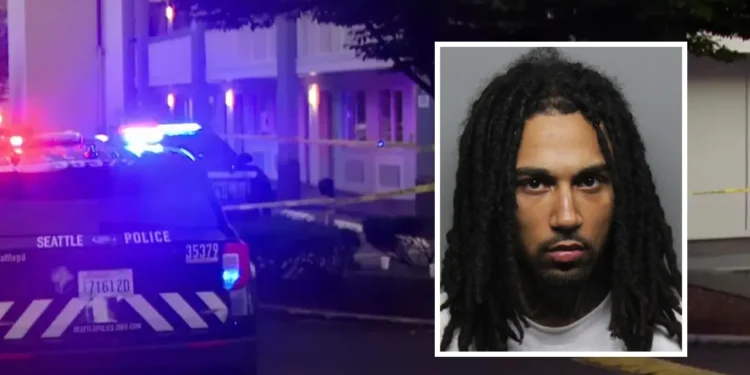Law enforcement officials in California are attempting to locate a Seattle murder suspect after he was inadvertently released from custody last week.
The Contra Costa County Sheriff’s Office announced Monday they are investigating how Isaiah Jamon Andrews, 20, was freed from jail despite being held on a warrant connected to a fatal shooting in Seattle earlier this month.
Seattle police identified Andrews as a suspect in the October 15 homicide at the Hotel Nexus near 2100 North Northgate Way. That afternoon, officers responded to a shooting and discovered 20-year-old Theodore Wheeler dead in the parking lot.
Andrews was apprehended on October 18 following a vehicle pursuit with police in California.
He was processed into the Contra Costa County jail on local charges and the warrant for the Seattle homicide.
On October 22, jail personnel released Andrews from custody. The sheriff’s office stated they were “investigating the circumstances surrounding” Andrews’ release from detention.
Seattle Police Chief Shon Barnes addressed the escaped suspect situation.
“I think sometimes people forget that it is a criminal justice system: cops, courts, and corrections. And although we did our due diligence, the courts and that part of the system did not,” Chief Barnes explained. “Certainly, it was an error that if they had to go back and do it all again, they would’ve done something differently. But it’s my understanding that he was released by accident and they are working feverishly to put him back into custody.”
Anyone with information on Andrews’ whereabouts should call 911. The Contra Costa Sheriff’s Office can be reached at (925) 646-2441. Tips can be emailed to tips@so.cccounty.us or submitted via anonymous voice message at (866) 846-3592.
The mistaken release of a murder suspect held on out-of-state warrants represents catastrophic jail administrative failure where booking staff either overlooked Seattle’s hold or processed paperwork incorrectly, allowing a homicide suspect to walk free days after arrest.
Isaiah Jamon Andrews’ October 18 California arrest following a vehicle pursuit suggests he fled Seattle after the October 15 Hotel Nexus shooting, with the three-day gap between murder and apprehension providing time to travel roughly 800 miles south before police captured him.
The October 22 release occurring just four days after Andrews’ booking indicates jail staff failed to conduct basic review of custody status before processing release paperwork, a procedural lapse suggesting inadequate verification systems or understaffed facilities rushing through administrative tasks.
Theodore Wheeler’s death at age 20 in the Hotel Nexus parking lot creates tragic parallel where both victim and alleged killer were barely into adulthood, raising questions about circumstances leading two young men into fatal confrontation at North Seattle extended-stay hotel.
The Hotel Nexus location near 2100 North Northgate Way places the homicide in a commercial area adjacent to Northgate Mall and Interstate 5, a neighborhood with transient populations where extended-stay hotels sometimes attract criminal activity alongside legitimate travelers.
Chief Shon Barnes’ “criminal justice system: cops, courts, and corrections” comment deflects responsibility from Seattle Police while criticizing California jail operations, though his frustration reflects legitimate concerns that detective work securing arrests proves futile when custody facilities release suspects.
The “working feverishly to put him back into custody” characterization suggests Contra Costa County Sheriff’s Office recognizes the severity of their error and has mobilized resources to recapture Andrews before he commits additional crimes or permanently evades justice.
The October 18 vehicle pursuit circumstances remain unclear regarding whether California police knew Andrews was a Seattle murder suspect during the chase or discovered the warrant only after apprehension when running his information through law enforcement databases.
The local charges on which Andrews was initially booked in Contra Costa County likely stemmed from the vehicle pursuit itself, potentially including evading police, reckless driving, or other offenses providing California jurisdiction independent of Seattle’s murder warrant.
The four-day window between Andrews’ mistaken release on October 22 and Monday’s public announcement suggests sheriff’s officials initially hoped to quietly recapture him without publicizing their error, only issuing alerts after locating him proved unsuccessful.
Seattle Police Department’s reliance on California authorities to maintain custody of murder suspects highlights interstate cooperation challenges where jurisdictional boundaries require trusting other agencies to properly execute warrants and maintain holds.
The anonymous tip options including email and phone lines reflect standard practices encouraging public assistance while protecting informants who fear retaliation from suspects or associates if their identities become known.
Andrews’ current whereabouts unknown status creates public safety concerns as a murder suspect roams freely, potentially remaining in California’s Bay Area or returning to Seattle where familiarity with geography and social networks could help him evade capture.
The investigative review into release circumstances will likely examine whether jail staff received proper training on processing out-of-state warrants, whether computer systems adequately flagged Seattle’s hold, or whether individual employee negligence caused the error.
Contra Costa County’s potential liability for releasing a murder suspect could expose the jurisdiction to lawsuits from Theodore Wheeler’s family, arguing negligent jail operations enabled their son’s alleged killer to escape justice and potentially harm others.
The incident mirrors other cases nationally where jail booking errors released dangerous suspects, indicating systemic problems in custody facilities where overwhelming caseloads and inadequate staffing create conditions where mistakes become inevitable rather than exceptional.
Washington state authorities lack jurisdiction to arrest Andrews in California without extradition proceedings, meaning Seattle police must rely entirely on California law enforcement to locate and detain him before beginning the legal process returning him to face murder charges.







